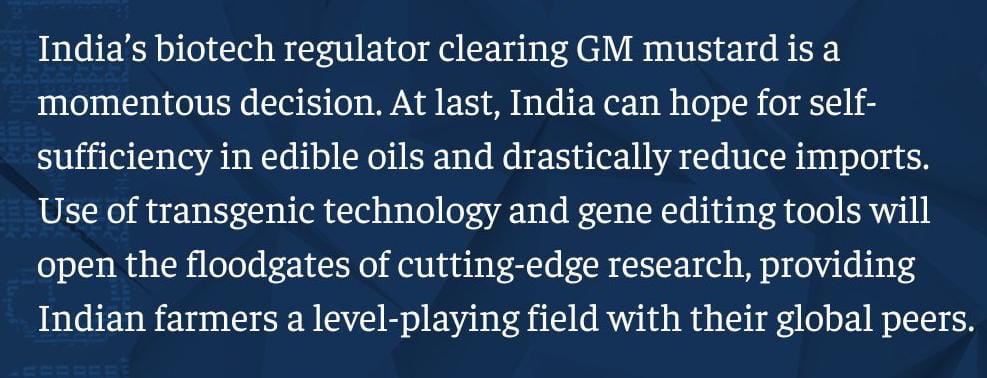Note4Students
From UPSC perspective, the following things are important :
Prelims level: GM Mustard
Mains level: GM crops, advantages and risks associated with it
 Context
Context
- The recent clearance by the government for the release of GM Mustard Hybrid DMH 11 based on the recommendations of GEAC under the Ministry of Environment, Forests and Climate Change is a bold decision in the best interest of our farmers and the nation.
What are Genetically modified organisms (GMO)
- Changes in genetic material: GMOs can be defined as organisms (i.e., plants, animals or microorganisms) in which the genetic material (DNA) has been altered in a way that does not occur naturally by mating and/or natural recombination
- Transfers of genes: It allows selected individual genes to be transferred from one organism into another, also between nonrelated species.
- GM foods: Foods produced from or using GM organisms are often referred to as GM foods
- GM Mustard: GM mustard crop was introduced, which was later withdrawn. There is a raging debate going on advantages and disadvantages of GMOs. For a long time, further study was requested by farmers, environmentalist on GMO crops.
 Advantages of GM mustard?
Advantages of GM mustard?
- Benefits to producers and consumers: GM foods are developed and marketed because there is some perceived advantage either to the producer or consumer of these foods. This is meant to translate into a product with a lower price, greater benefit (in terms of durability or nutritional value) or both. Initially GM seed developers wanted their products to be accepted by producers and have concentrated on innovations that bring direct benefit to farmers (and food industry generally)
- Improves crop protection: One of the objectives for developing plants based on GM organisms is to improve crop protection.
- Insect Resistance: Some GMO foods have been modified to make them more resistant to insects and other pests. This means the amount of pesticide chemicals used on the plants are reduced, so their exposure to dangerous pesticides is also reduced
- Develops stronger Crop: Another benefit that GM technology is believed to bring about is that crops can be engineered to withstand weather extremes and fluctuations, this means that there will be good quality and sufficient yields even under a poor or severe weather condition
- Provides Environment Protection: GM crops often requires less time, tools and chemicals, and may help with reducing greenhouse gas emissions, soil erosion and environmental pollution
- More Nutritious Foods: According to the UN Food and Agricultural Organization (FAO), some GM foods have been engineered to become more nutritious in terms of vitamin or mineral content.
- More economic benefits: Larger production leading to increased farm income, reduced poverty, low food prices and thus reduced hunger and malnutrition. Besides new food products are also included, diversifying food varieties
What is the risk associated with GMO?
- Contamination of genes: GMOs contaminate forever. GMOs cross pollinate and their seeds can travel far and wide.
- Irreversible changes in gene pool: It is impossible to fully clean up our contaminated gene pool.
- More herbicides in our food: Genetic engineering allows plants to survive high doses of weed killers, resulting in higher herbicide residues in our food.
- Super weeds and super bugs: GMO crops are creating ‘super weeds’ and ‘super bugs,’ which can only be killed with more toxic poisons.
 Why there was necessity to grant approval for GM Mustard?
Why there was necessity to grant approval for GM Mustard?
- To meet our current challenges: Over-exploitation of natural resources (soil, water, biodiversity), declining factor productivity, urgency to achieve sustainable development goals, especially ending poverty and hunger, and addressing timely the adverse effects of climate change the best option is scientific innovations and their scaling.
- The adoption of GM food crops is in our broader national interest: Genetically modified maize, soybean, cotton, tomato and canola are grown across the world and the area currently under GM crops is about 200 m ha. Besides India, these have been grown for many years in the US, Brazil, Argentina, Canada, Australia, Philippines, Pakistan, Bangladesh, and China.
- To meet the existing deficit in edible oils: India is currently importing around 13 million tonnes at a cost of Rs 1.17 lakh crore to the exchequer. Interestingly, of this, 2.0-2.5 mt soybean oil and 1.0-1.5 mt canola oil is already GM. Hence, we are consuming GM oil already, besides, the 1.5 mt of GM cotton oil produced domestically.
- Associated health benefits: It is scientifically proven that the consumption of refined oil does not allow any protein to enter the human system. Thus, the consumption of GM oil is completely safe from a health point of view.
- High yields to farmers: A major concern of our farmers is that yields of mustard are low and have stagnated for a long time at around 1,260 kg/ha, much lower than the global average of 2,000 kg/ha. Yields of canola in Canada, China and Australia are almost three times higher than in India since they use GM hybrid technology. Mustard is a very important oilseed crop, grown in 6.0 -7.0 million hectares, mostly in Rajasthan, Haryana, Punjab and Madhya Pradesh. Thus, the government’s decision to allow the production of GM Mustard hybrids will go a long way in increasing our yields, while reducing the use of pesticides.
 What else needs to be done?
What else needs to be done?
- Providing enabling environment: The Department of Agriculture (DoA) and ICAR need to move forward fast and provide an enabling environment to test the available seed of Hybrid DMH 11 in the current rabi season.
- Encourage public-private partnership: This needs to happen on several farmers’ fields in the mustard belt. It must also encourage public-private partnerships to produce quality seeds to cover more area next year.
- Encouraging further innovation: Also, scientists at ICAR institutes must be encouraged to develop new GM Mustard hybrids on a mission mode. Allowing the production of GM Soybean and GM Maize going forward will also be a positive step, increasing both the productivity and profitability of these crops and doubling farmers’ income.
Conclusion
- The decision to remove the unscientific ban on GM crops reflects the determination of the government to move towards Atmanirbhar Bharat. It also meets the aspirations of our scientific community and farmers can derive the benefits of innovative technology.
Mains Question
Q. How GM mustard crop are different from conventional crops? What are the benefits and risks of adopting the GM mustard crop?
Click and Get your FREE copy of Current Affairs Micro notes
Get an IAS/IPS ranker as your 1: 1 personal mentor for UPSC 2024
 Context
Context Advantages of
Advantages of  Why there was necessity to grant approval for GM Mustard?
Why there was necessity to grant approval for GM Mustard? What else needs to be done?
What else needs to be done?
